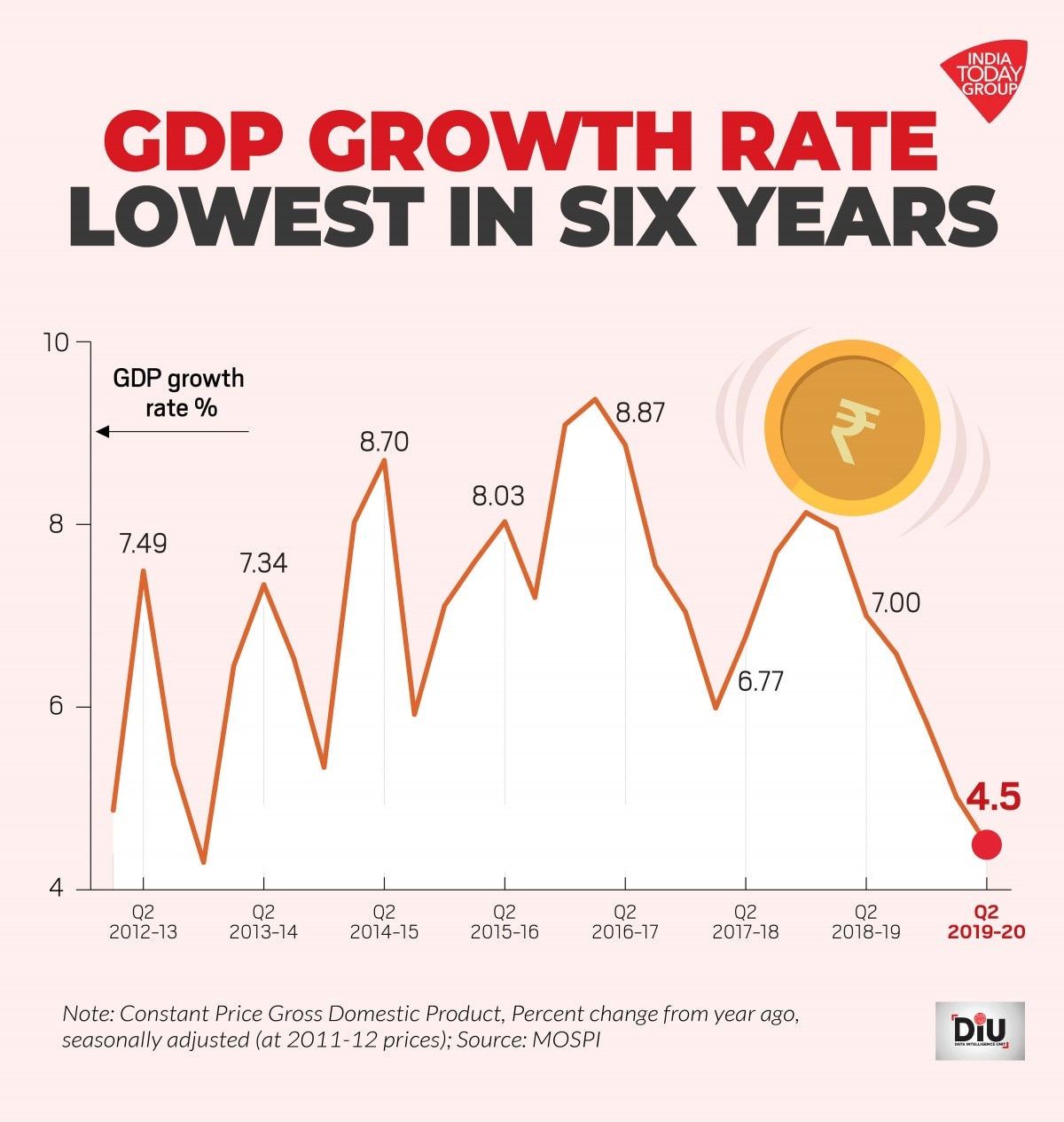


The Indian economy saw a slump in its GDP growth rate in the second quarter of the current fiscal year, coming in at only 5.4% compared to the projected 6.5%. This decrease was driven by slow growth in manufacturing and mining, along with weak government expenditure and private consumption. However, the Ministry of Statistics and Programme Implementation remains hopeful, stating that the overall growth in the first half of the fiscal year was 6.2%. The Reserve Bank of India has projected a growth rate of 7.2% for the full fiscal year.
India's GDP Growth Slumps to 5.4% in Q2
India's economic growth slowed to a five-quarter low of 5.4% in the second quarter (Q2) of the current fiscal year (FY23), falling short of expectations. This marks a significant decline from the 6.5% growth recorded in the previous quarter (Q1).
Key Factors Driving the Slowdown
The slowdown in economic activity was primarily driven by weaker performance in manufacturing, mining, and quarrying sectors. Manufacturing growth decelerated to 4.3% from 14.3% in Q1, while mining and quarrying contracted by 2.4%. Additionally, government expenditure and private consumption remained subdued, further dampening growth.
Impact on the Broader Economy
The GDP slowdown raises concerns about the health of the Indian economy. Slower growth could lead to job losses, reduced consumer spending, and weaker investment activity. The government's fiscal deficit may also widen as revenue collection slows.
Government Response and Outlook
Despite the disappointing Q2 performance, the Ministry of Statistics and Programme Implementation has expressed optimism for the overall fiscal year. The first half of FY23 witnessed growth of 6.2%. The Reserve Bank of India (RBI) has projected a full-year growth rate of 7.2%.
Top 5 FAQs and Answers
1. What caused the slowdown in Q2 GDP growth?
Slow growth in manufacturing, mining, and quarrying, along with weak government expenditure and private consumption.
2. What is the impact of the GDP slowdown?
Reduced consumer spending, potential job losses, and a wider fiscal deficit.
3. What is the government's response?
The government remains optimistic and expects to achieve 6.2% growth in the first half of FY23 and 7.2% for the full year.
4. What are the prospects for future growth?
The RBI has projected a growth rate of 7.2% for FY23, but uncertainty remains due to global economic headwinds.
5. How does the current slowdown compare to past economic downturns?
The current slowdown is less severe than previous economic crises such as the 2008 global financial crisis. However, it highlights the vulnerability of the Indian economy to external shocks and the need for sustainable growth strategies.

The Social Security Administration recently released updates for 2026, including a potential 2.7% increase to benefits. However, the official announcement of the cost-of-living adjustment (COLA) could be delayed due to the government shutdown. While an increased COLA is positive for beneficiaries, some argue that it still may not keep up with the rising cost of living. Additionally, beneficiaries who currently receive physical paper checks will need to make arrangements for direct deposit or a Direct Express card to continue receiving their benefits.

The Indian government has given its approval for the formation of the 8th Central Pay Commission, which will be tasked with assessing and making recommendations around pay, benefits, and working conditions for over 1.2 crore central government employees and pensioners. The Commission, which will have a chairperson, a part-time member, and a member-secretary, will have 18 months to complete its work and will also look at emolument structures and conditions in the private sector and CPSUs. The recommendations are expected to be implemented from January 1, 2026.

Prime Minister Narendra Modi launched the Gyan Bharatam Portal, dedicated to preserving and promoting India’s vast and unique manuscript heritage. Speaking at the Gyan Bharatam International Conference, PM Modi emphasized the importance of preserving India’s knowledge legacy and adapting to changing times. He also highlighted how the ancient manuscripts reflect India’s diverse cultural heritage and contribute to humanity’s progress in various fields.

The Bharat International Rice Conference (BIRC) 2025, organized in New Delhi, has gathered delegates from over 80 nations, aiming to boost India's rice export share from 40% to 60%. IREF National President Prem Garg highlighted the need for increased export to benefit Indian farmers and declared the rice industry to be self-sufficient. The event, with participation from farmers, diplomats, and exporters, also emphasizes on banning pesticides and government support with ports and logistics to further boost the industry.

Prime Minister Narendra Modi's announcement, coinciding with the 150th birth anniversary of Sardar Vallabhbhai Patel, to showcase only indigenous Indian dog breeds at the upcoming National Unity Day Parade highlights the country's reliance on self-sustained K9 forces. The Ekta Diwas Samaroh celebrated India's diversity and unity, while PM Modi emphasized the significant role of indigenous dog breeds in Indian military and cultural traditions. With the current population of 150 Indian breeds deployed in strategic areas, the initiative, which gained momentum after PM Modi's visit to the BSF National Dog Training Centre in 2018, showcases the agility, stamina, and adaptability of these breeds in diverse terrains and climates.

A young Australian expressed their difficulty in managing their finances and confessed to spending a whopping $994 on eating out in a month. Seeking advice from Reddit users, they revealed a pricey morning routine that contributed to their high expenses. Despite also spending on family meals, the important takeaway is that they acknowledged the need for budgeting and were open to learning from others' financial wisdom.

Nvidia, the Silicon Valley titan, has broken yet another market record by becoming the first company to reach a staggering $5 trillion valuation. The remarkable achievement highlights the profound impact of the company's AI chips in driving the ongoing AI revolution. However, concerns have been raised about inflated tech valuations, with the IMF warning of a possible "AI bubble." As Nvidia continues to expand globally and diversify its offerings, it remains to be seen if it can sustain its unprecedented growth.

The Federal Reserve announced a quarter point rate cut, bringing the benchmark interest rate down to a range of 3.75% to 4%. While some economists predict another cut in December, Federal Reserve Chair Jerome Powell stated that a third consecutive reduction is not guaranteed. The decision was made amid the ongoing government shutdown, causing policymakers to rely on private sector indicators for their decision. This move signals the Fed's greater concern about a cooling job market than lingering inflation. With 10 out of 12 members voting in favor of the action, the outcome of the meeting showcased deep division.

Father Muller Charitable Institutions, led by director Fr Faustine Lucas Lobo, has taken a big step towards progress and excellence by inaugurating and blessing four modern classrooms for the students of Father Muller College of Physiotherapy and Father Muller College of Allied Health Sciences. The ceremony, attended by management committee members, faculty, and staff, also saw the presence of respected individuals like Dr Michael Santhumayor and Fr George Jeevan Sequeira. These new additions are a testament to FMCI's commitment to providing top-quality education to its students.

The US Federal Reserve made the decision to reduce its key interest rates for the second time in a row, bringing it down to 3.75%-4.00%. The rate cut was approved by a 10-2 majority vote, with two dissenters who wanted a steeper cut or no cut at all. The Fed also announced that it will stop the reduction of its asset holdings from December 1, but did not provide any indication of its plans for the next meeting in December.